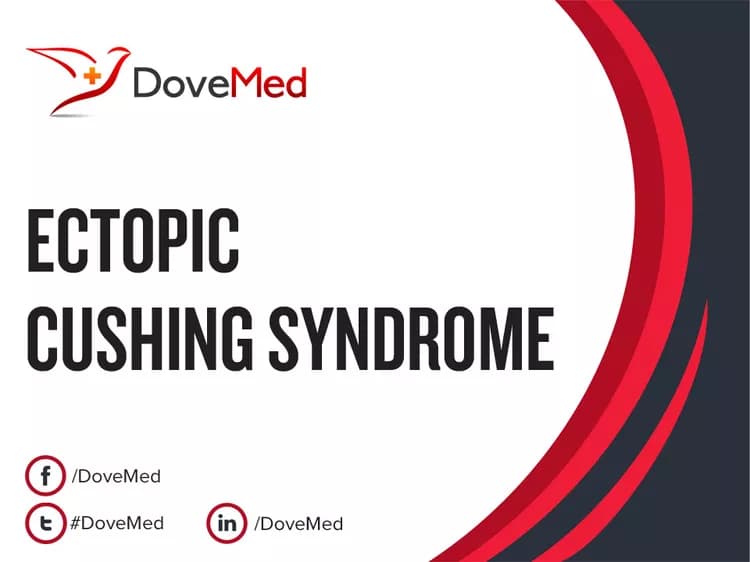What are the other Names for this Condition? (Also known as/Synonyms)
- Ectopic ACTH Secreting Tumor
- Occult Ectopic ACTH Secretion
- Paraneoplastic Cushing Syndrome
What is Ectopic Cushing Syndrome? (Definition/Background Information)
- Ectopic Cushing Syndrome is caused by the production of adrenocorticotropic hormone (ACTH) by a tumor outside the pituitary gland. Normally, ACTH hormone is produced by the pituitary gland and its function is to regulate hormonal production of the adrenal gland.
- Ectopic Cushing Syndrome is caused by tumors of the lungs, pancreas, or thyroid gland that ectopically produce ACTH. The increased ACTH production leads to excess production of the hormone cortisol in the body
- This disorder is relatively uncommon and it affects individuals in the 20-50 year age group. However, men are known to be 3-times more vulnerable to the condition than women
- Some symptoms of Ectopic Cushing Syndrome include rounded and red face, central obesity with thinning of arms and legs, thinning of skin with easy bruising, weak bones and muscles, and increased vulnerability to infections
- Removal of the ACTH-producing tumor is the most effective treatment for this syndrome. However, if the tumor were to be found inoperable, then medicines to block cortisol production may be recommended
- Currently, there is no effective preventive guideline available for Ectopic Cushing Syndrome. However, early diagnosis and treatment can help reduce the risk of the disorder
- The prognosis is generally good following complete removal of the tumor. However, in some cases, the tumor might recur or high cortisol levels may persist
Who gets Ectopic Cushing Syndrome? (Age and Sex Distribution)
- Ectopic Cushing Syndrome is a fairly uncommon condition that affects young and middle-aged adults between 20-50 years of age
- There is a male predominance and the male-female ratio is 3:1
- All racial and ethnic groups may be affected
What are the Risk Factors for Ectopic Cushing Syndrome? (Predisposing Factors)
Some known risk factors for Ectopic Cushing Syndrome include:
- Male gender
- Increasing age
- Smoking
It is important to note that having a risk factor does not mean that one will get the condition. A risk factor increases ones chances of getting a condition compared to an individual without the risk factors. Some risk factors are more important than others.
Also, not having a risk factor does not mean that an individual will not get the condition. It is always important to discuss the effect of risk factors with your healthcare provider.
What are the Causes of Ectopic Cushing Syndrome? (Etiology)
Ectopic Cushing Syndrome is caused by the excess production of adrenocorticotropic hormone (ACTH) by a tumor other than the adrenal gland or pituitary gland. The following tumors have been reported to ectopically produce ACTH, leading to an overall increase in cortisol levels in the body, resulting in the disorder (and associated signs and symptoms):
- Small cell lung cancer
- Carcinoid tumors of lung
- Islet cell tumors of the pancreas
- Medullary carcinoma of the thyroid
- Tumors of the thymus gland
What are the Signs and Symptoms of Ectopic Cushing Syndrome?
Some signs and symptoms associated with Ectopic Cushing Syndrome include:
- Central obesity with thinning of arms and legs
- Buffalo hump
- Acne
- Headaches, fatigue
- Frequent urination; thirst
- Changes in mental state
- Thinning of skin; darkening of the skin
- Purple stretch marks appearing on the abdominal area, thighs, and breasts
- Moon face (round, red and full face)
- Bone pain and weakness; muscle weakness
- Increased vulnerability to infections
- Decreased sexual desire in men or impotency
- Irregular periods or excessive hair growth in women
How is Ectopic Cushing Syndrome Diagnosed?
The diagnosis of Ectopic Cushing Syndrome might require the following tests and examinations:
- Complete evaluation of medical history, along with a thorough physical examination
- Diagnostic tests such as:
- Urine tests for creatinine and cortisol
- Blood tests for abnormal ACTH, cortisol, and potassium levels
- Blood test to check for fasting blood glucose levels
- MRI and CT scans to detect the presence of tumors
- Dexamethasone suppression test
Many clinical conditions may have similar signs and symptoms. Your healthcare provider may perform additional tests to rule out other clinical conditions to arrive at a definitive diagnosis.
What are the possible Complications of Ectopic Cushing Syndrome?
Some potential complications of Ectopic Cushing Syndrome include:
- Recurrence or spread of the tumor to distant sites
- Persistent high levels of cortisol causing signs and symptoms
How is Ectopic Cushing Syndrome Treated?
- The most effective treatment for Ectopic Cushing Syndrome is the surgical removal of the tumor
- If the tumor has spread or is at an inoperable location, then medicines may be prescribed to stop cortisol production
How can Ectopic Cushing Syndrome be Prevented?
The majority of Ectopic Cushing Syndrome cases are reportedly not preventable.
- Early treatment of tumors and prompt treatment of the syndrome can reduce risk in certain cases
- Smoking cessation can help avoid certain types of cancers known to produce ACTH ectopically
What is the Prognosis of Ectopic Cushing Syndrome? (Outcomes/Resolutions)
- The prognosis of Ectopic Cushing Syndrome is considered to be good, with a full recovery expected after removal of the tumor
- The prognosis is also dependent upon the severity of the cancer
- There also remains the possibility that the tumor can recur, even after treatment
Additional and Relevant Useful Information for Ectopic Cushing Syndrome:
- Cushing syndrome is an adrenal gland disorder caused by high levels of glucocorticoid hormones in the body
The following article link will help you understand Cushing syndrome:
http://www.dovemed.com/diseases-conditions/cushing-syndrome/
Related Articles
Test Your Knowledge
Asked by users
Related Centers
Related Specialties
Related Physicians
Related Procedures
Related Resources
Join DoveHubs
and connect with fellow professionals


0 Comments
Please log in to post a comment.